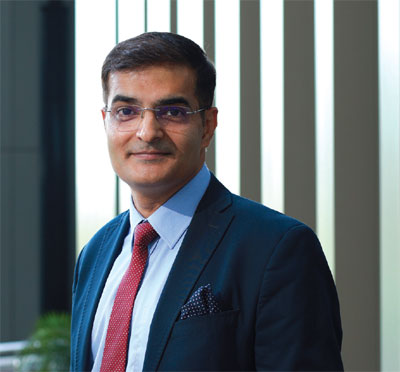Thales Has More Than 50 Offset Partners and More Than 75 Supply Chain Partners and is Cultivating Local Industrial and Supplier Ties

Can you share about Thales’ growing presence in India?
As India progresses towards its goal of becoming Aatmanirbhar, constructive measures are being taken across sectors including defence. These measures along with efforts of the industry will pave the way for long-term success of India’s indigenous defence sector.
For close to seven decades, Thales has been partnering the Indian growth story by sharing its technologies and expertise in defence, aerospace, transport and digital identity & security markets. Over the years, it has developed a mature industrial footprint in the country’s defence sector via a diverse range of high-tech products, services, and collaborations. The organisation has been proudly supporting the Indian armed services’ modernisation efforts, aiding them in preparing for, achieving, and maintaining tactical superiority over any form of risk, all with the purpose to build a future that everyone can put their trust in.
How do you see Thales partnerships in India?
Thales has more than 50 offset partners and more than 75 supply chain partners and is cultivating local industrial and supplier ties to serve India’s defence and aerospace needs. The organisation has formed various cooperative partnerships with public and private sector industries, like with Bharat Electronics Ltd dedicated to radars and Reliance Aerostructures Ltd for electronic warfare and radar, among others.
Also further strengthening our resolve of making in India for India and for the world, we have also joined hands with Bharat Dynamics Limited, Kalyani Group, MKU, and others. Thales has developed extensive and broad skill sets in India through these collaborations and is contributing to manufacturing in India for India as well as for the world.
Going ahead too, Thales will continue to develop its footprint in India by strengthening its local teams, partnerships and innovation.
Thales recently came to be recognised for combating climate change. How has moving towards sustainability reflecting in Thales’s policies as well as work on ground and how will it make a difference in the coming years?
Thales has been accelerating its ESG action plan to help build a safer, greener, more inclusive world. In 2019, Thales set itself ambitious targets for the reduction of its operational CO2 emissions and has now raised those targets and is aiming to achieve a 35 per cent reduction by 2023, a 50 per cent reduction by 2030, and ‘net zero’ by 2040. These targets are consistent with the Paris Agreement’s objective of limiting global warming to 1.5 degree. The Group will begin the SBTi (Science-Based Target initiative) certification process to substantiate its progress towards these goals. In addition, the Group expects to adopt eco-design principles for 100 per cent of its new products and services by 2023.
Thales is drawing on its technology expertise to fight global warming. In the civil aviation sector, for example, optimising aircraft operations has been identified as one of the major ways to achieve the objective of halving emissions by 2050. Optimising air transport would reduce CO2 emissions by 10-15 per cent, or by more than 100 million tonnes of CO2, by 2040. As a world leader in flight management systems (FMS) and air traffic management (ATM), the Group is developing flight path optimisation solutions that would reduce aircraft CO2 emissions by up to 10 per cent in the near-term future.
As an expert in critical-decision support solutions, the Group is developing disruptive technologies that will make artificial intelligence more energy-efficient. Thales is the first company to develop ‘frugal’ AI-based on algorithms that only require small amounts of energy. Applying the principles of eco-design, Thales researchers are developing low-energy algorithms as an integral part of the design of neural network architectures. Whenever possible, they also prioritise knowledge-based symbolic or hybrid AI, which are much more energy efficient. Thales developers are also shifting their attention from Big Data to Smart Data, favouring quality over quantity, and improving electronics design and implementation to offer electronic circuits that consume very little energy.
Also, Thales is applying eco-design principles to a growing proportion of its new developments and intends to adopt these principles for 100 per cent of its new products and services by 2023. The Group is also actively promoting its eco-designed smartcards, which are expected to account for 35 per cent of all its smartcard sales by 2025.
How is Thales leveraging engineering in India?
India is a pillar of engineering for Thales. Today, we have more than 1,300 engineers working with Thales in India at its engineering centres in Bengaluru and Delhi National Capital Region. Our engineering centre in Noida is focused on Digital Identity and Security business of Thales including technologies around data protection & encryption, cybersecurity, IoT and biometrics, etc. Also, our centre in Gurugram specialises in managing real-time big data analytics. Our engineering centre in Bengaluru is first-of-its-kind in India, focusing on hardware, software and systems engineering capabilities for both the civil and defence sectors, serving global needs. We are looking forward to hire and nurture more talent in high technology roles for our engineering competence centres in India.
Thales also continues to partner with academia to further R&D in the country. Last year, we joined hands with IIT-Delhi on open hardware Research and Development. The collaboration seeks to enable co-development of complex microprocessor architectures and multi-core processing systems using configurations available with the RISC-V open ISA specification. These systems will bring value to applications in areas such as edge computing, smart manufacturing, defence and space.
Thales will continue to develop its footprint in India by strengthening its local teams, partnerships and innovation.

